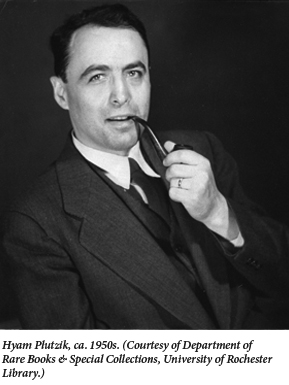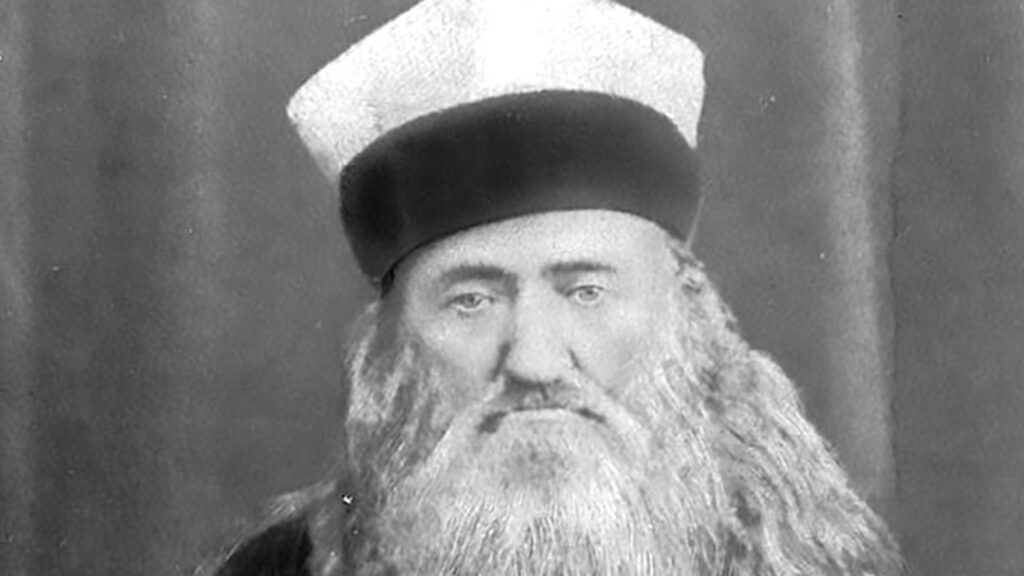Golden Apples
If poets, as Shelley would have it, are the unacknowledged legislators of the world, then among the most unacknowledged is Hyam Plutzik—a poet who, says a voice—over for a 2007 documentary film of his life, “did a major work and then vanished.”
Vanished! Well, it was Rochester. But still: not so fast.
In 1962, at the time of his death at age 50, Plutzik had authored five volumes of poetry. The year before, his blank-verse epic Horatio, which chronicled Hamlet’s friend’s failed attempts to redeem the prince’s “hurt honor and name,” was a finalist for the Pulitzer Prize. His poems were deep-drawn, gnomic things, and his tone was deaconish, if not outright godlike. “As nearly as I can tell,” wrote the poet James Dickey, “the world he writes about is more God’s than man’s.”
It isn’t that Plutzik’s contemporaries were unwilling to tackle large topics or even that they were averse to mulling over God and Religion and The Human Condition. But when Plutzik did so, it sounded like this: “The dignity of sorrow / Was the only blessing under the cloud of his god.” Allen Ginsberg’s version went like this: “Moloch! Solitude! Filth! Ugliness!” In the poetic landscape of the ’50s, Plutzik’s classicizing voice would lose out.
But his talent was undeniable, and, after his death, Plutzik’s poems were anthologized and championed by Ted Hughes and Anthony Hecht. In 2007 came the aforementioned documentary, which bore the title Hyam Plutzik: American Poet. Now, Apples from Shinar (which originally appeared in 1959 and includes a 451-line excerpt from Horatio) has been reissued, to commemorate the centennial of the poet’s birth and the 50th anniversary of the Plutzik Reading Series at the University of Rochester (where the poet, the school’s first Jewish professor and a much-beloved teacher, spent his professional life).

Nonetheless, relative to his achievement, Plutzik is very much unknown. Nor did his fame, brief as it was, come quickly. His early work was poorly received by critics. “His taste is wicked, he boggles at nothing,” said one. “Plutzik’s muse is angry and too often explodes in ejaculations like ‘victory! victory! victory! Victory!'” said another. The poet Donald Hall called Aspects of Proteus “surely the worst title of all time.” Richard Wilbur was more charitable, writing that the allusion to the mythical shape-shifter offers a reviewer “the choice of saying regretfully that ‘Mr. P. has not yet settled on a style,’ or of saying happily that ‘Mr. P. is agreeably versatile.'” Wilbur settles on versatile: while Plutzik’s contemporaries were building reputations on short lyrics, he strove for (and achieved) technical range, veering from incantatory tetrameters (“Of all the waves of all the seas”) to pawky, elliptical pensées reminiscent of another neglected poet, Laura Riding:
(As if to ask what meeting
Could overmatch the wonder
Of opaque hostile Being
Emergent out of nothing.)
Neither “modern” nor Modernist, Plutzik is ultimately notable for, in the words of Eric Ormsby, trying “to recreate a credible Shakespearean voice in American verse”—the very successful creation of which “doomed his verse to obscurity.” Something else doomed his verse to obscurity: an affinity for Jewish concerns second only in English poetry to A.M. Klein’s. (On another occasion, Ormsby noted Harold Bloom’s omission of Plutzik from an anthology of American religious poems. If Plutzik’s bardic biblicism is not on Bloom’s radar, then his reputation might well be beyond hope.)
Plutzik’s masterpiece, Apples from Shinar, was published at a time when the culture was in hot pursuit of the postwar American Jewish idiom, and expectations were set for a voice that was shrewd and wistful and rash and cracked wise. But the poet was more Blake than Bellow. Poetry magazinebetrayed its disappointment: “Mr. Plutzik does not make his Jews ugly enough to be beautiful.” No, indeed, and he had the number of those who would create Jews to the specifications of Poetry reviewers. In the poem “Portrait,” he wrote:
Notice with what careful nonchalance
He tries to be a Jew casually,
To ignore the monster, the mountain—
A few thousand years of history.
. . . .
he of all men might yet be master of self, all self-possession,
Were it not (how gauche and incredible!) for the one ill-fitting garment—
The historical oversight in the antique wardrobe—
The shirt, the borrowed shirt,
The Greek shirt.
Notice how even when at ease he is somehow anxious,
Like a horse who whiffs smoke somewhere nearby faintly.
Notice with what nonchalance,
The magazine in his hand and the casual cigarette to his lips,
He wears a shirt by Nessus.
Nessus, a centaur, killed Heracles by lending him a shirt smeared with Nessus’ own tainted blood. In invoking this myth, the poet issues an emphatic havdalah: There is Jew and Greek, slave and free, male and female. We are not all one in material America any more than we are in Christ Jesus, and we may as well acknowledge this and wear our own damn clothes.
For those unwilling to confront this poem, there are two routes of dismissal. The first, older evasion was to acknowledge the potency of Judaism but to call Plutzik irritatingly “obsessed” with it. The newer evasion is to minimize the potency, as David Scott Kastan does in an otherwise fine afterword to the new edition of Apples from Shinar, writing that “however much [Plutzik] refused to ‘ignore’ that ‘monster,’ he was not a Jewish poet, but a gifted poet who happened to be born Jewish.”
We’ve gotten accustomed to “happened to be” as a well-meaning idiom, but Judaism, for Plutzik, was no accident of birth. As T.S. Eliot put it, tradition “cannot be inherited, and if you want it you must obtain it by great labor.” Plutzik was an active and affirming Jew, and the roots of much of his poetry—not only the subject matter but the sensibility, the set of values, the voice—are in his Jewishness. There’s no “happened to be” about it.
This isn’t to say that Plutzik can’t be latitudinarian, or that he doesn’t wish that Athens and Jerusalem might not meet, if not mate (Shinar, as it happens, is a biblical name for Babylonia). He bestows Jewish honorifics on his favorite English writers (“Our Master, William Shakespeare”), pairs Greek and Hebrew (“The Mythos of the Man from Enoch”) in his titles, and avenges Freud (if not Phyllis Diller) upon Shakespeare in an oedipal retelling of Hamlet:
. . . ‘I have killed the murderer.’
” ‘Who? Of whom?’
” ‘Fang, who murdered my father . . .’
“And her eyes grew glazed in her bruised face, and the scream
Entered her mouth and: ‘Fool! Fang was your father!
Him I lay with on the night you were conceived—
And often before and after . . .’
But his most tangled encounter is with Eliot himself. In “For T.S.E. Only,” he wrote:
You called me a name on such and such a day—
Do you remember?—you were speaking of Bleistein our brother,
The barbarian with the black cigar, and the pockets
Ringing with cash, and the eyes seeking Jerusalem,
Knowing they have been tricked. Come, brother Thomas,
We three must weep together for our exile.
The poem is a response to T.S. Eliot’s infamous “Burbank with a Baedeker: Bleistein with a Cigar,” with its yet more infamous lines “The rats are underneath the piles. / The jew is underneath the lot.”
Yes, this is a minor work of a major poet. Still, it’s worth noting that Eliot himself chose to reprint “Burbank with a Baedeker” both in his Selected Poems, published post-Holocaust in 1948, and in his Collected Poems 1909-1962. Nor was Plutzik the only Jewish poet to be indignant. The Anglo-Jewish Emanuel Litvinoff read his own hot rejoinder aloud at a literary meeting that included Eliot himself:
I am not one accepted in your parish.
Bleistein is my relative and I share
the protozoic slime of Shylock, a page
in Stürmer, and, underneath the cities,
a billet somewhat lower than the rats.. . . .
Let your words
tread lightly on this earth of Europe
lest my people’s bones protest.
It’s worth reading the two poems, Litvinoff’s and Plutzik’s, side-by-side. They are both significant achievements, but Litvinoff maintains a stance of pure outrage while Plutzik is generously pitying and seeks understanding: “In the time of sweet sighing you wept bitterly, / And now in the time of weeping you cannot weep”:
You drew us first by your scorn, first by your wit;
Later for your own eloquent suffering.
We loved you first for the wicked things you wrote
Of those you acknowledged infinitely gentle.
Wit is the sin that you must expiate.
Bow down to them, and let us weep for our exile.
. . . .
You, hypocrite lecteur! mon semblable! mon frère!
It would be just like Plutzik to bring Baudelaire’s famous line, en version originale, into a poem already freighted with Shylock, Dante, Jesus, Titus, and Old Possum himself. But his more-in-sorrow-than-in-anger affirmation of poetic fraternity may be, if not the more effective rejoinder, in the end the more effective poem.
Apples from Shinar‘s engagement with Judaism is far from a matter of simply extracting an owed pound of flesh from the canon. There is, for example, his visionary “The Priest Ekranath” (evidently an invented name) who is both William Blake and the biblical Joseph prophesying famine: “They see the desert in the growing leaf.” Ekranath’s monologue is a sobering dream of figures who seduce and destroy: an animal-eyed vagrant (“one of a tribe / Cultureless, without iron, art, or altar”), a “White Lady of splendid thighs and bosom / Without a seedsman or a harvester,” and most of all the “holy harlots at Askelon,” who close out the poem with an unsettling recitation.
. . . I who am wise
Through the sacred harlots’ embraces know the syllables
(Ah, they are powerful and barbarous!)
Of the secret incantation that gives them strength.
Hear how they thunder! Listen: Issachar
Levi simon reuben judah dan
Zebulun asher naphtali menassah ephraim.
The roll call of Israelite tribes is unsettling not only because of its lofty authoritative tone, but because of its form. The tribes are not presented here in birth order, nor are they divided according to their mothers or territorial divisions. Only eleven names are listed, with Gad and Benjamin omitted. But while the names are presented irregularly, their appearance in the poem’s final two lines marks a shift from the previously irregular meter into a thumping pentameter. Altogether, this is a mysterious work worthy of its temple-cult subject, a brave Englishing of what Marianne Moore called the “spontaneous unforced passion of the Hebrew language.”
The poems in Apples from Shinar are defiantly lovely, limpid and ambiguous both. On every page, there are ripe images and rich sound-play and a shuttling among registers of insight. This is a golden book.
Suggested Reading

People of the Book World
"The Jewish market has become quite a good one,” a Knopf editor observed; even the “goy polloi” were buying, wrote another staffer.

Insiders and Outsiders
The Jewish sect that rejected cholent.

Fictional Revisionism
The first time I picked up Joshua Cohen’s new novel, The Netanyahus: An Account of a Minor and Ultimately Even Negligible Episode in the History of a Very Famous Family, I put it down when I reached page eighty-four.

Sephardi Soap
With the runaway success of the novel The Beauty Queen of Jerusalem, a television adaptation was all but inevitable, and the decision of Yes Studios to invest record amounts of cash in the show, while eyebrow raising, is also unsurprising.
Comments
You must log in to comment Log In